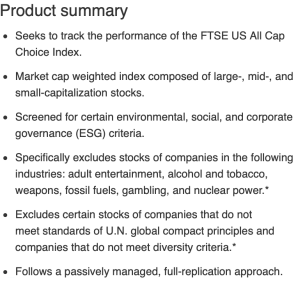When I migrated from journalism to PR decades ago, I was appalled at services major firms were promising but I knew couldn’t deliver. I shared my dismay with my father, a brilliant businessman who I always turned to for counsel and advice. He was neither sympathetic nor supportive.
“Bullshit sells,” my father said. “You better get used to it.”
I recalled my father’s words reading Vanguard’s revised definition of socially responsible investing, commonly referred to as ESG investing because only U.S. companies with supposedly progressive environmental, social, and governance are deemed worthy for inclusion in the firm’s ESGV fund. Proponents of ESG investing say there is compelling evidence that do-gooder companies outperform the less holier-than-thou corporations.

ESG’s pariah industries are adult entertainment, alcohol and tobacco, weapons, fossil fuels, gambling, and nuclear power. Vanguard’s ESG criteria also excludes companies that “do not meet standards of U.N. global compact principles” and companies that do not meet “diversity criteria.”
I applaud any and all initiatives that curtail the sale of tobacco and weapons because these products kill people. I’m out of my depth when it comes to climate change, so I’ll jump on the bandwagon and also oppose fossil fuels and nuclear power. But eschewing investments in adult entertainment, alcohol, and gambling imposes moral judgments on products and activities that are widespread and considerably less harmful than those peddled by other companies in ESGV’s fund.

Let’s start with alcohol. Evidence has emerged in recent years that drinking alcohol in moderation is actually good for you. I’d rather drink 12 ounces of wine or beer a day than a 12-ounce can of Coke or Pepsi, whose makers respectively rank 21 and 23 in ESGV’s holdings. Coke and Pepsi products have contributed to a dramatic rise in diabetes in the U.S. and around the world. As well, Pepsico last year paid no corporate taxes despite posting a $9 billion profit. OECD experts say paying taxes is a corporate social responsibility.

While I’m opposed to state lotteries because they exploit poor people, I know many Wall Street folks and other people for whom gambling gives them great honest pleasure. Las Vegas casinos are known for their fun-filled family entertainment and Nevada’s and New Jersey’s gaming commissions are considerably more rigorous when it comes to character and wrongdoing than the SEC. JP Morgan Chase, ESGV’s eighth largest holding, couldn’t get a gaming license because of its China bribery settlement and other scandals.

ESG proponents might have issues with adult entertainment, but the statistical evidence is overwhelming they watch it. An online survey conducted by academics found that 73 percent of women and 98 percent of men watched porn in the previous six months in which the survey was taken. ESG proponents presumably don’t have a subscription to Netflix, ESGV’s 29th largest holding. The media company features a show called “Sex Education” aimed at teenagers that features sex and nudity. Another Netflix show “Baby” has come under fire from the National Center on Sexual Exploitation for its portrayal of teen sex trafficking.
As for ESG’s “diversity criteria,” there’s evidence that mandated diversity can hurt investment returns.
Let’s take a look at the social responsibility bona fides of some other ESGV holdings:
Alphabet (4th largest holding)

Alphabet owns Google, whose extensive list of privacy violation penalties included a record $57 million fine imposed by European regulators. Read this Washington Post story story if you want to understand how Google keeps you under surveillance. Google has more contract employees in the U.S. than it does salaried employees, which allows the company to avoid paying benefits. Google refused to work with the U.S. military but was okay working with the Chinese government, whose leadership is on record as saying that artificial intelligence is how it will achieve global domination.
Facebook (5th largest holding)

If someone wants to argue that a company whose business model is to provide a seemingly “free” service and then exploit users in hereto unimaginable ways and still be deemed a socially responsible company, I’m all ears. Please include how Facebook’s egregious privacy violations, warnings from founders saying the company is toxic, the criminal investigation that’s underway, and the repeated lies and distortions of Facebook’s top executives fit into the socially responsible equation.
Disney (11th largest holding)

A survey last year found that three quarters of Disneyland workers can’t cover basic expenses and one in 10 experienced homelessness. Of course, Disney vehemently denied the findings, as it did when Walt Disney’s multimillionaire granddaughter Abigail Disney also criticized the living conditions of Disney’s theme park workers.
Disney also was critical of a two-part Los Angeles Times series about the company’s sweetheart tax and other deals in its headquarters city, so much so that it banned the newspaper from its film screenings and showed the media company’s disdain for the First Amendment. Of course, Disney also is dismissive of the investigation the SEC is reportedly conducting regarding allegations the company has overstated its revenues for years.
Disney chief Robert Iger last year was paid $65.6 million – about 1,424 times the median Disney employee’s salary. The income disparity is as obscene as the most egregious adult entertainment content.
IBM (30th largest holding)
This faded-glory company shouldn’t be in a U.S. index because it has moved so many American jobs overseas that it now has more employees in India than it does in America. ProPublica deservedly won a Loeb award for exposing IBM’s systematic discrimination of workers over 40.
Underscoring how farcical corporate social responsibility claims have become, Investor’s Business Daily recently identified 33 profitable companies in the S&P 500 that paid no taxes in the past 12 months. On a hunch, I eyed the list figuring there would be at least one company trumpeting their social responsibility commitments. I guessed HP and the company didn’t disappoint. Cue the violins:
“Everything we do is designed to help create a more sustainable business and society,” HP insists.

Even more telling is that Barron’s, a major proponent of ESG investing (and not coincidentally a sponsor of an ESG conference) made no mention of HP’s altruism in a a recent story recommending the stock. The publication is bullish on HP because its depressed shares are “one of the cheapest stocks in tech land.” An ESG investor can snap up HP and if the shares appreciate, declare it another example of how companies committed to sustainability and social responsibility outperform the market.

Finally, a confession. I recently bought shares in AT&T, a company I consider a sin stock but is the 12th largest holding in ESGV. This is a company that’s paid record fines for deceiving customers, lied to Congress, and has eliminated more than 10,000 U.S. jobs after applauding Trump’s tax cuts that were intended to increase U.S. employment.
I feel guilty collecting AT&T’s six percent dividend yield because I’m profiting from all the poor saps who signed up for AT&T plans and didn’t understand the company’s billing shenanigans. As you’re reading this, hundreds, if not thousands, of AT&T customers are likely on hold “due to unusually heavy call volume” waiting to talk to someone in India about why their bills aren’t what they expected.
If I earn a profit on my AT&T shares, I will donate 10 percent of the proceeds to charity. That’s my idea of socially responsible investing.
